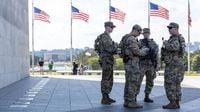The National Guard’s presence in Washington, D.C. is set to continue through November 30, 2025, after Army Secretary Dan Driscoll signed a memorandum extending the deployment of approximately 950 members of the D.C. National Guard. The move, confirmed by multiple outlets including ABC News, FOX News, and CNN, comes amid persistent concerns over crime in the nation’s capital, ongoing political debate, and a fresh lawsuit challenging the legality of the deployment.
The extension, formalized on September 3, 2025, leaves the timeline open-ended. As officials emphasized to ABC News and FOX News, President Donald Trump retains the authority to cut the mission short or extend it even further. For now, the November 30 date gives troops, their families, and employers some breathing room after what had become a cycle of 14- to 29-day rolling orders. National Guard members typically leave their civilian jobs to serve, so the extended period allows for better planning and ensures continuity of pay and benefits.
Brigadier General Leland D. Blanchard II, commanding general of the D.C. National Guard, made the extension clear in a video message released on September 4. “Our mission is not complete,” Blanchard said. “I've made the decision to extend the encampment as we continue to work to ensure everyone that walks these city streets is safe.” The message echoed the rationale behind the original deployment: President Trump’s call last month to address what he described as “out of control” crime in the District.
Since their arrival, National Guard troops have been a visible presence throughout the city, especially around the National Mall and other prominent areas. Their duties have ranged from the expected—patrolling and supporting law enforcement—to the unexpected, such as spreading mulch and collecting trash as part of what the administration has dubbed a “beautification” project. According to the latest update provided by the Guard and reported by ABC News, members have cleaned roadways, collected more than 677 bags of trash, and disposed of five truckloads of plant waste in coordination with the U.S. National Park Service.
The extension applies specifically to the 950 members of the D.C. National Guard. Roughly 1,300 additional troops from states including Louisiana, Mississippi, Ohio, Tennessee, South Carolina, and West Virginia remain under the command of their respective governors, with many already ordered to stay through the end of December 2025. This split in command has added another layer of complexity to the deployment, with local and federal authorities sometimes at odds over jurisdiction and operational control.
The White House, for its part, has stood by the deployment. A White House official told FOX News on September 4 that President Trump is “committed to the long-term safety and security of Washington, D.C. for its residents and visitors.” However, the official declined to speculate on whether the November 30 deadline might be extended further, saying only that any future decision would rest with the president.
The D.C. mayor’s office has remained largely silent on the extension beyond previous statements. Mayor Muriel Bowser emphasized the city’s ability to request or use federal resources if needed, stating, “We have a framework to request or use federal resources in our city. We don’t need a presidential emergency.” The administration, however, has continued to frame the deployment as a necessary response to rising crime.
By the numbers, the impact of the National Guard’s presence has been significant, at least according to federal and local authorities. Attorney General Pam Bondi reported on September 4 that since the deployment began on August 11, there have been 1,841 arrests and 188 illegal firearms seized. Just the day before, 81 arrests were made and 13 firearms were recovered, including one found at a downtown school. Bondi stated the mission is “making the nation’s capital safe again for all Americans.”
Yet the deployment has not been without controversy. On September 3, D.C. Attorney General Brian Schwalb filed a lawsuit challenging what he called an “illegal deployment” of National Guard troops. The suit argues that President Trump’s move to place nearly 2,300 National Guard troops under federal control—some deputized by the U.S. Marshals Service—amounts to an “involuntary military occupation” that exceeds presidential authority. Schwalb contends that the federal government is overstepping its boundaries by asserting control over these troops without formally calling them into active federal service, a move he says violates laws prohibiting military involvement in local law enforcement.
The White House has pushed back on the lawsuit, insisting that the deployment is well within the president’s constitutional powers. This legal tug-of-war has fueled a broader debate about the proper role of the military in domestic affairs—a debate that has only intensified as President Trump has suggested similar deployments could be used in other cities like Chicago and Baltimore, where he has cited concerns over rising crime.
Amid the political and legal wrangling, practical considerations have played a key role in the decision to extend the deployment. As reported by CNN and confirmed by multiple officials, extending the Guard’s orders beyond 30 days ensures that troops qualify for federal military benefits, including housing allowances and health care. These benefits are not available for shorter deployments, so the longer orders protect both the personnel and their families from gaps in support.
For the National Guard members themselves, the extension means more time away from their civilian lives. Many have left full-time jobs and families behind to serve in the capital. The extended orders give their employers time to make alternate arrangements, reducing the uncertainty that comes with repeated short-term extensions. A spokesperson for Joint Task Force-DC told ABC News that all Guard members deployed to D.C. have already had their orders extended beyond the initial expiration of September 10 to secure their eligibility for pay and health care benefits.
The coming months will likely see continued debate over the deployment’s efficacy and legality. Supporters argue that the presence of the National Guard has helped reduce crime and restore order, pointing to the number of arrests and firearms seizures as evidence. Critics, including D.C. officials and civil liberties advocates, warn that the ongoing military presence risks undermining local control and blurring the line between civilian law enforcement and military authority.
As November 30 approaches, all eyes will be on Washington to see whether the deployment ends as scheduled, is cut short, or is extended yet again. For now, the city’s residents—and the troops themselves—are left to navigate a capital transformed by a mission that, as Brig. Gen. Blanchard put it, is "not complete."


